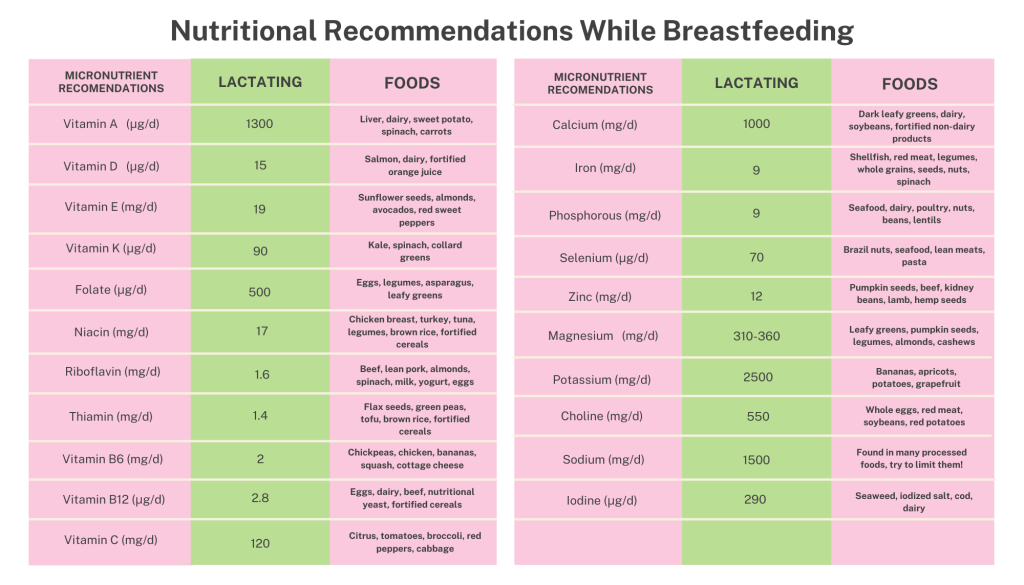Nutrition For The Breastfeeding Parent
December 30, 2022 2024-06-20 17:34Nutrition For The Breastfeeding Parent
Nutrition For The Breastfeeding Parent

What we eat plays such an important role in our lives. Food helps our bodies function, supplying all the nutrients, vitamins, and minerals they need to work best. Now, think about how important nutrition is while sustaining another life!
Producing milk requires a lot of your body’s energy, which means you’ll need extra calories. Roughly an extra 450-500 calories daily is typically necessary to adequately support milk production. However, not all calories are equal! Nutrients matter, and you need enough of them both to support your little one’s growth and development, and also to ensure that you do not become deficient in the process! When caloric and nutrient needs are not met, milk supply suffers and the nutritional value of your milk may also be reduced.
Nutritional Recommendations
A well-balanced diet is ideal for both you and baby! Eating a wide variety of foods will help you meet the recommendations for macronutrients and micronutrients, which are essential for maintaining good health.
What exactly are macronutrients and micronutrients? Macronutrients are what your body needs in large amounts- protein, carbohydrates, and fats. Micronutrients are the vitamins and minerals we consume in smaller amounts, but make no mistake- they are vital to our health and longevity! In fact, micronutrient deficiencies can lead to severe, and potentially fatal conditions.
Eating fortified foods can be a practical and cost-effective way to get a large amount of many micronutrients. However, keep in mind that fortified foods are often highly processed and contain high levels of sodium, fat, and sugar. Make careful decisions about which fortified foods you choose (for example, Cheerios would be a better choice than Lucky Charms). Consuming whole, unprocessed foods is ideal whenever possible.
For a full, printable list of micronutrient recommendations (including food sources) when breastfeeding, click HERE.
Common Deficiencies When Lactating
Below are the micronutrients you are most likely to be lacking during your breastfeeding period, and the possible side effects of deficiencies.
Magnesium- Magnesium plays an important role in the regulation of nerve and muscle function, blood pressure and sugar levels. Most people are actually low or deficient in magnesium, but this can create greater issues during lactation. Typical symptoms include headaches, poor sleep, depression and anxiety, and muscle cramps. Low magnesium levels can lead to increased stress hormones, which affect your body’s ability to release milk, thereby reducing milk supply. Magnesium works hand in hand with calcium. Low magnesium can also lead to low calcium, and vice versa. So it is important to be sufficient in magnesium consumption to maintain supply and reduce risk of deficient calcium levels as well!
Below are three of the best sources of magnesium along with their recommended serving size:
- Pumpkin Seeds (Unshelled)- 1 oz, 168 mg
- Almonds (Dry Roasted)- 1 oz, 80 mg
- Black Beans (Cooked)- ½ cup, 63 mg
Other good sources include leafy greens, nuts, grains, and fish. Dietary supplementation is generally considered safe, but speak to your healthcare provider prior to beginning any supplements.
Calcium- One of the most abundant minerals in the body, calcium is responsible for the strength of our bones and teeth. It is also responsible for the functioning of the nervous, muscular and circulatory systems. Lactating parents tend to lose a small amount of bone mass, as calcium is drawn from the bones into breast milk. Also, as mentioned above, a deficiency in calcium can create a deficiency in magnesium. Low calcium intake can directly affect bone strength in both you and your baby, so it is vital to consume adequate amounts! Low vitamin D can also result in calcium deficiency, as this vitamin helps the body absorb the calcium we consume.
Below are three of the best sources of calcium along with their recommended serving size:
- Yogurt, plain (Nonfat)- 8 oz, 488 mg
- Orange juice (Fortified)- 1 cup, 349 mg
- Milk, low fat (1%)- 8 oz, 305 mg (whole milk is also good, just slightly lower in calcium)
Other great sources include cheeses, leafy greens, fortified tofu, and almond milk. Supplementation is generally not necessary, but this can be discussed with your healthcare provider if you have concerns.
Vitamin D- On top of its major role in the absorption of calcium, and thus in bone production, studies are now also finding a correlation between vitamin D and cardiovascular disease, diabetes and depression. Between 50-90% of vitamin D is absorbed through the skin from sunlight, and the rest is obtained through diet. While it may seem easy to get plenty, over ⅓ of adults are deficient! Since vitamin D is transferred through breast milk, it is important for the breastfeeding parent to maintain adequate levels in their own diet.
Below are three of the best sources of vitamin D along with their recommended serving size:
- Salmon (Cooked)- 3 oz, 14.2mcg
- White Mushrooms- 4 oz, 9.2 mcg
- Fortified Milk (dairy or non-dairy)- 8 oz, 2.5-3.6 mcg
Other good sources include fortified cereals, fortified orange juice and canned tuna. Again, please speak with your healthcare provider if you think you need supplementation.
Iron- A major component of hemoglobin, iron helps carry oxygen throughout the body via red blood cells. Without enough iron, you may find yourself feeling tired, short of breath, and weak. Babies typically make enough iron on their own for the first 6 months of life. Afterwards, their iron requirements increase, so it is important for you to maintain adequate iron absorption. Once your menstrual cycle returns, it is especially important to consume more iron to counteract the iron lost. Keep in mind that iron is better absorbed along with vitamin C, so it is a good practice to consume them together.
Below are three of the best sources of iron along with their recommended serving size:
- Breakfast Cereal (Fortified)- 4 oz, 16-18 mg
- Oysters- 3 oz, 8 mg
- Spinach (Cooked)- 8 oz, 6.4 mg
Other great sources of iron include organ meats, beef, tofu, and beans. Iron supplementation is more common during pregnancy than when breastfeeding. Speak to your healthcare provider if you suspect you have an iron deficiency.
Zinc- This mineral is essential for infant growth and development. The dietary recommendation increases during lactation in order to support your baby. Zinc plays a large role in immune function, DNA synthesis and much more. Low levels of zinc in the body can impact sense of taste, smell, and can impact cognitive function.
Below are three of the best sources of zinc along with their recommended serving size:
- Oysters (Cooked)- 3 oz, 28.2 mg
- Beef (Roasted)- 3 oz, 3.8 mg
- Roasted Pumpkin Seeds- 1 oz, 2.2 mg
Other great sources of zinc include turkey breast, lentils, and fortified cereal. Supplementation is typically not needed, however if you are vegan or vegetarian, you may be at a higher risk of zinc deficiency during your lactating period, and could benefit from speaking to your healthcare provider.
Iodine- Iodine has a direct impact on maternal thyroid function, and is vital for proper fetal growth and infant development. The concentration of iodine in your milk is dependent on your iodine levels, so it is important to consume enough to support both you and your baby. If you are deficient, your baby may have motor and cognitive impairments.
Below are three of the best sources of iodine along with their recommended serving size:
- Cod (Baked)- 3 oz, 158 mcg
- Seaweed- 1 oz, 116 mcg
- Table Salt (Iodized)- ¼ tsp, 76 mcg
Other good sources include oysters, nonfat milk, iodine-enriched bread, greek yogurt, and hard boiled eggs. Typically, iodine supplementation is recommended for lactating parents, so please speak to your healthcare provider to determine if a supplement is necessary for you.
Choline- An essential factor in muscle control and other functions within the nervous system, choline plays an important role in your baby’s brain development. Lactating people tend to be at risk of inadequate choline status, especially in those with low vitamin B12 status or those who do not take folic acid supplements.
Below are three of the best sources of choline along with their recommended serving size:
- Egg (Hard Boiled)- 1 large egg, 147 mg
- Chicken Breast (Roasted)- 3 oz, 72 mg
- Kidney Beans (Canned)- 4 oz, 45 mg
Other good sources of choline include dairy milk, cruciferous vegetables, and red potatoes. Typically, supplementation is recommended for breastfeeding parents, however most prenatal/multivitamin supplements do not contain choline. If you are vegetarian or vegan, you may be at a higher risk of choline deficiency. Again, please speak to your medical provider prior to beginning any supplementation.
What Should You Avoid Eating When Breastfeeding?
When it comes to breastfeeding, most foods are okay in moderation. However, it’s when certain foods are eaten in excess that can cause supply concerns or potential issues for your baby.
Here are some foods to be cautious with, but you do not need to fully avoid them:
– Fish high in mercury (swordfish, bigeye tune, mackerel, etc.)
– Alcohol
– Caffeine
– Supply-reducing herbs (parsley, thyme, sage, oregano, mint)
Remember, many micronutrients work hand in hand to support you and your growing baby! Maintaining a well-balanced, varied diet is the ideal way to meet your nutritional needs. If you suspect you are deficient in any nutrients, we highly recommend discussing it with your healthcare provider to create a plan that works for your lifestyle.
Happy eating!
Click Below To Enlarge Image & Print
Search
baby bottle feeding breastfeeding breastfeeding latch breastfeeding pain breast milk storage breast refusal bugs cedar park regional clogged duct contraceptives daycare discharge doula engorgement exercise foremilk galactogogues hindmilk hospital how to latch baby labor low milk supply low supply massage mastitis newborn care nursing strike nutrition pacifiers plugged duct plugged ducts postpartum prenatal pumping relactation siblings sleep sore nipples breastfeeding suck training tax breaks thrush tongue tie video weaning
Search




